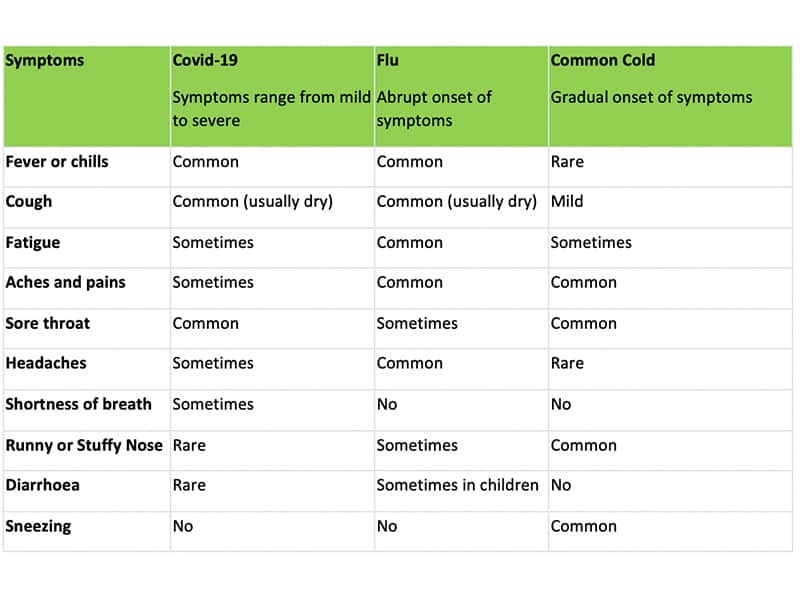What is Coronavirus?
Coronaviruses are a large family of viruses that cause illness ranging from the common cold to more severe diseases such as Middle East Respiratory Syndrome (MERS) and Severe Acute Respiratory Syndrome (SARS). This family of viruses is zoonotic, meaning they are transmitted between animals and humans.
Coronavirus disease (Covid-19) is a new strain that has not been previously identified in humans and is thought to have originated in a food market in Wuhan, China, the epicentre of the outbreak.
Common signs of infection include fever, cough, shortness of breath and breathing difficulties. In more severe cases, infection can cause pneumonia, severe acute respiratory syndrome, kidney failure and even death. The initial symptoms are different to flu or the common cold:
People of all ages can be infected by COVID-19. It is highly contagious and because it is new and therefore there is as yet no herd immunity, it can spread extremely rapidly through the population. While the vast majority of individuals will have mild-moderate symptoms, especially in younger people, certain groups are more at risk of becoming severely ill, with a significantly higher mortality rate. These include older people, and people with pre-existing medical conditions (such as asthma, diabetes, and heart disease). At the time of writing, the mortality rate from Covid-19 differs between countries with rates of two in Singapore, where there has been proactive management to contain the virus as well as adequate intensive care facilities and ventilators, to estimates as high as 15% in Wuhan when the initial disease overran the healthcare system. In Italy, where the disease continues to spread very rapidly, perhaps due to initial complacency and failure to implement social isolation, the death rate has been reported to be almost 8%. The reasons for this increased rate may relate to the older population with 40% of cases and almost 80% of deaths occurring in those aged over 70 years. There also seems to be a gender divide with twice as many men dying from Covid-19 than women; the reasons are unclear but perhaps related to more common underlying diseases such as high blood pressure. However, in Germany, the mortality rate to date is just 0.3%.
What is clear is that COVID-19 is one of the greatest threats that the world has faced in recent years, and in the UK we are on the verge of a rapid increase in its spread which, as is happening in Italy, risks overwhelming the healthcare system.
How best to protect yourself?
Clearly the best advice is to minimise your chances of catching it by:
• good hand and respiratory hygiene
• avoid close contact with people known or suspected to have it, or showing signs of coughing and sneezing
• avoid crowded places
In addition, boosting your body’s own immune system would seem to be sensible and certain vitamins and lifestyle can be helpful in this regard.
Vitamin D
there is considerable evidence to indicate that vitamin D plays a very important role in the body’s immune system, especially against viruses. It is produced naturally in the skin in response to sun exposure, and therefore most of us in the UK have low levels. While some foods (oily fish and dairy products) contain Vitamin D, it is in relatively low amounts and the easiest and most pragmatic means of boosting your levels is to take an additional supplement of Vitamin D3. The recommended dose of 400-800iu a day is generally insufficient, and we would recommend a dose of 2000 iu a day.
Vitamin C
is traditionally associated with good immune function although perhaps more for bacterial infections. However, you will come to no harm from having a diet high in fresh fruit and vegetables – foods which are naturally high in vitamin C.
Vitamin B12
is one of the Vitamin B family and there is some evidence that low levels will hinder immune function against viruses. Again, one will come to no harm from taking additional B12 supplements and unless there is the very rare case of not absorbing it properly from the gut, oral supplements should be adequate.
Exercise
The mortality from Covid-19 comes from its effects on the lungs and heart. It causes inflammation within the lungs which can result in areas of fluid accumulation and reduced oxygen transfer, which if severe enough requires artificial ventilation. In the heart, the virus can directly affect the heart muscle causing a myocarditis and impaired heart muscle function. Therefore, improving your cardio-respiratory reserve through exercise may reduce the chances of any viral induced inflammation causing critical effects. It is never too late to start a regular exercise regime and the benefits will start to become apparent within just a few days. Exercising for 20-30 minutes of moderate cardiac exercise 3-4 times a week will be sufficient to improve your fitness and increase your cardio-respiratory reserves.
Assessment of co-morbidity and cardio-respiratory fitness
Assessment of your cardiac function and whether you have any underlying respiratory disease can help you know if you are increased risk of suffering complications of Covid-19, as well as any other underlying illness which might affect your immune response.
Diagnosis of COVID-19
There is much debate on the role of testing for Covid-19. The current test uses RT-PCR (reverse transcriptase polymerase chain reaction) to determine the presence of actual replicating virus in the body. There are only a few NHS central laboratories offering this in the UK, although the plan is to increase these to allow more rapid testing of larger numbers of people. While some private clinics are also offering this testing, the quality control of the testing may not be robust.
Currently, in the UK, diagnosis is made on basis of compatible symptoms only. Scientists are desperately working on a blood test to measure antibodies in the blood against the Covid-19 virus which would determine if someone has been exposed to Covid-19 in the past and therefore has immunity to it. Initial clinical trails are currently being undertaken of this test and it is hoped to be generally available within the next 1-2 months.
Treatment of COVID-19
At present, treatment is largely supportive with bed rest. There is no specific anti-Covid treatment. Paracetamol should be given for pain rather than ibubrufen or other similar anti-inflammatory drugs as there is reasonable circumstantial evidence that the latter drugs can make matters worse. The reasons for this are not entirely certain but may relate to their actions on cell permeability or an anti-inflammatory action and dampening of the body’s immune response against the virus.
There is debate as to whether 2 commonly used classes of drugs might worsen matters in patients infected with Covid. These drugs, termed Angiotensin Converting Enzyme (ACE) Inhibitors and Angiotensin Receptor Blockers (ARBs), are commonly used in the treatment of hypertension and cardiovascular disease, as well as being frequently prescribed in patient with diabetes. In a recent letter published in Lancet Respiratory Medicine, researchers noted that in 3 large cohorts of patients admitted to intensive care with complications of Covid-19, the most common co-existing diseases were hypertension and diabetes. They proposed that ACE inhibitors and ARBs could increase the risk for developing severe Covid-19 as the coronavirus binds to target cells through ACE2, the amount of which has been shown to be increased by these drugs. Interestingly, ACE2 is also increased by ibubrufen. However, recent consensus statements from the European Cardiac Society and joint American Heart Association/ American College of Cardiology recommend that patients being prescribed these drugs do not discontinue them, although they also state that urgent more detailed research on this matter is required.
There is mounting interest in the potential benefits of a type of medicine used in the treatment of malaria and some auto-immune diseases – chloroquine or hydroxychloroquine. Initial reports from Wuhan and more recently from France have suggested they can reduce the duration and severity of symptoms by upto 50%. Further more detailed and larger rigorous clinical trials are currently being undertaken to further evaluate their role and currently they are not being advocated for routine use, although it is of interest that their export from the UK has been stopped and there are severe restrictions on their availability to pharmacies for dispensing.
An alternative strategy for treatment is with a specific anti-viral drug. One such is remdesivir (GS-5734), originally developed for treatment of Ebola virus, which has been shown to inhibit Covid-19 infection in laboratory studies. Remdesivir belongs to a class of drug called a nucleoside analogue prodrug and a recent case report showed that treatment with it improved the clinical condition of the first patient infected by Covid-19 in the United States. More detailed clinical trials are currently underway, although it need be noted that as it is an experimental drug, remdesivir is not expected to be generally available for treating a very large number of patients in a timely manner.
Vaccination
The ultimate management of Covid-19 will be vaccination. Having identified the precise genetic sequence of the responsible virus, enormous efforts are now being directed across the globe towards development of a vaccine. The World Health Organization is working with scientists on at least 20 different coronavirus vaccines with some already in clinical trials. However, the vaccines are still a long way away from being available for public use, as the necessary clinical trials and safety approvals required to get a workable vaccine to market could take up to 18 months. Then there will be the challenge of producing sufficient quantity for the worldwide population who will all simultaneously be requesting it.








